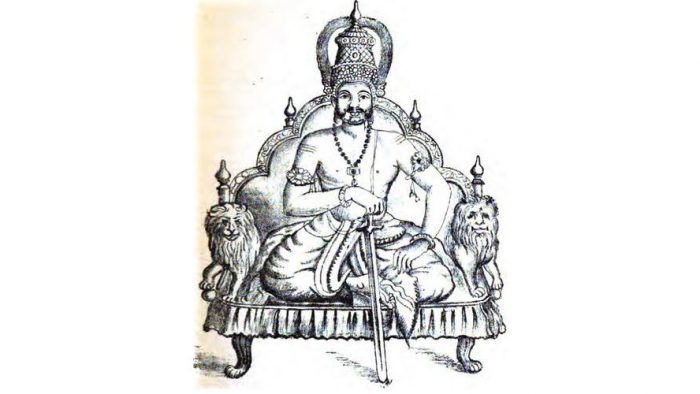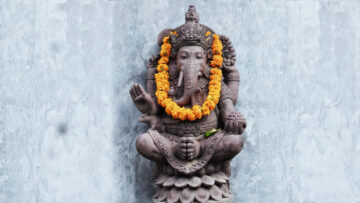There are 5 most prominent ancestors of the Kuru-Panchala race – Yayati, Bharata, Samvarana, Kuru and Sudasa. Apart from their individual excellence, their reign resulted in drastic and defining change in the Chandra-Aila dynasty to which they belonged. King Bharata created the Epoch of Bharatavarsha and the Vedas. King Samvarana brought back the glory of his branch defeating the Panchalas, another branch of Puru dynasty. King Kuru started an epoch that ended with Pandavas. In his times, the Kuru and Panchala discord intensified and assumed defining proportions. King Sudasa, least known of the lot, defeated a confederation of 10 Kings belonging to various dynasties/tribes establishing the Puru-Bharata race as the most prominent tribe in Bharatavarsha with a large empire and effecting a migration of other tribes to distant lands. His times also saw the resolution of a long-standing conflict between the 10 tribes and the expansion of culture according a high status to all of them. Rigveda 8-10 Mandalas stand testimony to that. Yayati, though, is the ancestor of all these illustrious Kings. His indulgences had a decisive impact on how the civilization shaped up over the next many generations.
There are four main stories associated with Yayati.
- His marriage to Devayani, daughter of Sage Shukracharya.
- His secret union with Sharmishtha, servant-friend of Devayani, resulting in a curse from Shukracharya,
- His elevation of Swargaloka through his good deeds and an eventual fall.
- His return to Swargaloka through the puNya accumulated by his daughter and her children.
Out of this, the first and the second are quite well-known stories.
Once, King Yayati passes through a forest and his horses run thirsty. Seeking water for them, Yayati approaches a well and to his shock finds a glowing but angry/sad maiden in it. Upon his questioning, she introduces herself as Devayani – the daughter of sage Shukracharya. She was pushed into the well by an angry Sharmishtha in a silly fight of one-upmanship – on who was greater, the Princess or the daughter of the Kingdom’s Guru – the very reason for them to thrive. In a fit of rage, each insults the other and their fathers. Sharmistha, in a momentary lapse of discretion, pushes Devayani into the well. Narrating this, Devayani urges Yayati to raise her up to safety as a worthy noble king of high birth. Accordingly, Yayati brings her up and with her permission proceeds to his capital.
Devayani, though, does not go home. Stubborn that she is, she waits on somebody to turn-up in search of her. As expected, a servant of her who was already in search finds her. Devayani sends back a message of rage and absolute refusal to come back, which is promptly communicated to her doting father Shukracharya. Upon his arrival, Devayani bursts into incessant sobs and tears. Learning the situation, the venerable Acharya is upset but is not void of his hard-earned perspective yet. He consoles her that such a fate does not befall upon anybody without any wrong on their part either in this birth or the previous. There was no point in blaming others. The virtues of Kshama, daya, tapas bring a long term good for the self rather than anger and revenge. Devayani would have none of it. She prevails upon Shukra that not only did she humiliate her but also wrongly insulted Shukra and his status. Shukracharya uses all his wisdom of shastras, practice, austerity and experience to convince her not to give in to her ego. But Devayani not only resists the wisdom but eventually makes Shukracharya blackmail King Vrishaparva into conceding two things as retribution. All the wealth of the Kingdom henceforth would belong to Sage Shukracharya in terms of authority and Princess Sharmishtha would turn herself into a servant of Devayani. One would expect a revolt from Sharmishtha. But her anger subsiding, she regains her sense of purpose and the good of all. She overcomes her ego and anger, agrees to be a servant in order to protect the Kingdom and ensures that Shukra does not leave King Vrishaparva. Satisfied with her triumph, Devayani re-enters the Kingdom of Vrishaparva. The victor Devayani may have lost her splendor a little, but Sharmistha, the vanquished, took to her new life as a penance. Her renunciation would pay in the future.
The forest was always a part of Devayani’s many turns in life. She was back again, along with Sharmishtha and other servants on a vihara. On a similar pass through, King Yayati stumbles upon the maidens but he has forgotten the past. Devayani, though, remembers him quite well, instantly falls in love and expresses her eagerness to marry him. The King is naturally very apprehensive of upsetting a Brahmin, that too Shukracharya for the fear of his curse. Devayani convinces that the marriage alliances between Kshatriyas and Brahmanas were the order of the day and Sage Shukra would not have any opposition. Devayani reminds him that he had held her hand once, a marriage of sorts, to bring her to earth from the well. Sage Shukra arrives at the scene and he blesses the marriage at the first request of Devayani. He promises to annul any dosha arising out of a marriage between the daughter of a brahmin and a Kshatriya through the power of his penance. But it was not without any risk and warning. Shukracharya knew that Sharmishtha would have to go along with Devayani as a servant. Sharmishtha was to be respected as a great lady and daughter of a King even though she was a nominal servant of Devayani. But the King was not to seek any union with Sharmishtha. Devayani was to be the Queen and Yayati was to be loyal to her status. She ought to be loved and taken good care, never to be hurt. Yayati promises, a grand marriage ensues and Devayani steps into his capital as a Queen along with her servant Sharmishtha. Sharmishtha would have her respectable place in a palace in the quiet Ashoka forest, convenient enough for her to frequent Devayani as a servant and friend, but without any proximity to the King.
Devayani and Yayati live happily as a loving husband and wife, with their romance surpassing that of Rati and Manmatha. In due course of time, Devayani becomes the mother of 2 sons – Yadu and Turvasu. Sharmishtha holds her life in a penance but gradually she gets disturbed. Devayani, of the same age, is married and a mother, but she is void of both pleasures. As it happens, Yayati once stumbles his way towards her palace in the Ashoka Vana. Sharmishtha thinks of him as the best person with whom she could seek a union and children. A great conversation follows. Yayati expresses his concern of violating the dharma and incurring the wrath of Shukracharya in multiple ways. Sharmishtha pursues him and convinces him that there is no violation in any way. Eventually Yayati accepts a union with her and 3 sons are born to them – Druhyu, Anu and Puru. Puru is the youngest of the lot. Sharmishtha manages to convince Devayani that the children were born from a union with a great Sage and Tapasvi – which is an apt description of Yayati’s austere way of life. Devayani, though, thinks of it as a renunciate brahmin sage and forgets it.
One day, Devayani along with Yayati, stumbles upon the children of Sharmishtha playing in Ashoka forest and Yayati immediately knew there was trouble. An eager Devayani enquires them about their father. The children run to Yayati lovingly. With no usual fatherly response from Yayati they go crying and complaining to their mother Sharmishtha in the palace. At once, the reality explodes in the mind of Devayani and along with fury, her constant companion, she returns to Shukracharya and complains. Now, Shukracharya has two weaknesses – the taste of sura and the emotion of his daughter Devayani. The former he has overcome after disastrous situation in the past. The latter would be a life-time indulgence. He loses his mind and without giving Yayati any opportunity to explain, Shukra mindlessly curses him to lose his youthful vigor so that he simply is not able to indulge with other women any-more. [In-spite of personal brilliance and illustrious lineage, Shukracharya continues to be less revered in the tradition for his slipping in anger].
Nevertheless, it was an opportunity for Yayati to relook at his life and take the path of renunciation, but he does not. Yayati laments that he has been very busy throughout his life in his royal expeditions, yagnas and austerities for the worldly good. He has never had enough pleasure of all kind – including the carnal, Yayati seeks a way out. His hunger is not quenched yet. By now, Shukracharya is back to his senses. He offers Yayati a path of resolution – arguably in the concern of his daughter’s happiness. If anybody else could sacrifice their youth in favour of Yayati then he could continue to enjoy the pleasures of all kind that come with youth. Yayati should have felt ashamed of seeking this from others but he chooses to exercise. Such is the unquenched thirst. Worse, he seeks the youth of his children. One by one Anu, Druhyu, Yadu and Turvasu refuse to part their youth in favour of their father, for a variety of reasons of indulgence. To each their Kaama, to each their artha. Blind in the rage of being denied pleasure, Yayati curses them to suffer different things – the loss of kingdom, the loss of wellbeing of off-springs, the loss of great livelihood and so on. Puru, the youngest son, alone accepts.
For a thousand years, Yayati enjoys all pleasure that he desired, including the company of an Apsara from Devaloka. However, Yayati continues to be righteous – performs many yagnas, sacrifices, acts of great puNya bringing the Chandra-Aila kingdom to great fame, prosperity, stability with his uprightness and Dharma. After a thousand years of indulgence, Yayati reflects. He still has the hunger for pleasure. But his righteous acts have brought upon him a realization that these pleasures will not end by merely seeking and indulging. He had to put an end himself through austerities. He returns Puru’s youth and nominates him as the next King in-spite of him being the youngest. The Leaders of all Varnas are aghast by his decision and they come in unison to question their King for his act against Dharma. How could he ignore Yadu – the eldest, son of the Queen Devayani, grandson of the venerable sage Shukracharya and give it away to the son (Puru) of the daughter (Sharmishtha) of a Rakshasa King (Vrishaparva). But Yayati holds his own and refuses to give-in. For one, Puru has conceded to the wishes of his father and lived his burden for a thousand years which is an extraordinary quality. That apart, he has been like a friend to his father. Beyond everything, sage Shukra has given his consent to Puru being coronated as the King because of his qualities. In this light, Yayati is convinced that Puru is the rightful inheritor of the kingdom. He recognizes that the ability to renounce is very essential for a good King and for all indulgence to bear good fruit. He seeks the permission of the leaders of all Varnas for Puru’s coronation. The leaders see the Dharma in Yayati’s choice and give their consent pleased. That they would not incur the wrath of Shukracharya was a relief too. Purut, thus, earns the core of Aila kingdom and the dynasty is henceforth known as Puru dynasty. The sons of Yadu, Turvasu, Anu and Druhya setup their kingdoms far away. The highest concern of Dharma becomes the highest indulgence of the Puru dynasty – or the Pauravas. Thus, the sons of a brahmin wife play a lesser role in the civilization. The son from a Daitya wife starts a long epoch that eventually played the most influential role in the Indian civilization.
This story is a great demonstrator of how lineages and high births are less important than our guna and our practices. Shukracharya is a sage with immense power but his love for his daughter, which is moha, often leads him to anger, that is krodha. There is a silent ‘mada’ of immense power always in his mind that lets him slip continuously. His love for his daughter blinds him from rightful action. He knows enough future to warn Yayati to not indulge with Sharmishtha. But his moha does not let him go further to release her from the servant status or making a way for her to live the life of a house-holder and enjoy the rightful pleasures of life. He curses Yayati mindlessly losing perspective that the curse is only going to hurt Devayani apart from bringing disorder to the kingdom. The curse of a sage should be a boon for the world not the other way around. A sage should know that forcefully obstructing the desires of a person, the kama – part of Purushartha, is neither going to bring good to the world, nor going to stop him from indulgence. The force of Kama can only be guided and spent through righteous indulgence and renunciation. The massive curse only results in the grand distortion of Yayati seeking the youth of his children. This could have resulted in bigger disasters. Puru resolves the situation with his innate orientation of renunciation. Without him, a terrible imbalance was to befall the kingdom. In his renunciation, he absorbs the indulgence of Yayati, the mindless acts of Shukracharya, the anger of Devayani and the depravity of his mother Sharmishtha. He alone stands as a tall man with the balance of Purushartha. After a thousand years of indulgence, Yayati’s realizes that he must give-up. It’s a two-pronged realization. Renunciation is not possible without rightful indulgence. Denial of rightful indulgence in pleasure only leads to unreasonable ways of fulfilling the same. At the same time, indulgence does not bring itself to an end by itself. It has to be explicitly brought to an end through austerity. Every person is to strive for this balance and each in his/her own situation and life. Its only a set of principles that one can be guided with, one has to practice them by one’s own self.
Puru alone seems to strike this balance so young, the prince of a Daitya lineage. Thus he becomes the rightful inheritor and starts an Epoch that eventually shapes the Indian Civilization and the Vedas. It is doubtful if Devayani, the daughter of a brahmin sage, ever realized this balance. Sharmishtha, the daughter of a Daitya King, shows a greater appreciation of this balance than Devayani. Despite his lineage, Yayati appreciates this very late which leads him to the next stage of his life which we shall see in the next story.
Disclaimer: The opinions expressed in this article belong to the author. Indic Today is neither responsible nor liable for the accuracy, completeness, suitability, or validity of any information in the article.









